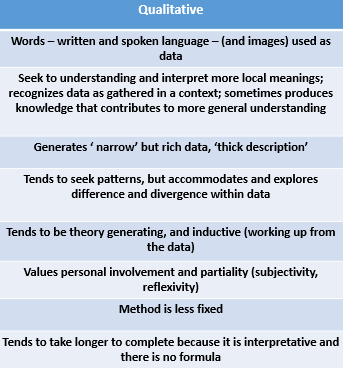Introduction
Definition (#f7aeae)
Important (#edcae9)
Extra (#fffe9d)
Qualitative: Utilizes words, ideas, perceptions, concepts.
It is subjective, ground theory, inductive approach.

Assumptions:
Qualitative researchers are concerned primarily with process, rather than outcomes.
Qualitative researchers are interested in meaning: how people make sense of their lives & experiences.
The qualitative researcher is the primary instrument for data collection and analysis. Data is mediated through this instrument, rather than through inventories or questionnaires.
Qualitative research involves fieldwork and observing behavior in a natural environment.
Qualitative research is descriptive, the researcher is interested in process, meaning gained through words or pictures.
The process of qualitative research is inductive, the researcher builds concepts, hypotheses, and theories from details.
Paradigm: Beliefs, assumptions and values shared by a research community, providing a framework for research.
3 major research paradigms are: Positivism, Postpositivism and Interpretivism.
Research Paradigms:
It’s a set of beliefs.
Characterized by the way their proponents respond to 3 questions:
Ontological: What is the nature of the ‘knowable’? What is the nature of ‘reality’?
Epistemological: What is the nature of the relationship between the knower (the inquirer) and the known (or knowable)?
Methodological: How should the inquirer go about finding out knowledge?
Inductive: Gaining understanding of the meaning. Flexible structure to permit changes of research emphasis as the research progresses.
Ontological Basis:
Many truths.
It’s concerned with the nature of reality and raises questions of the assumptions researchers have about the way the world operates.
Objectivism: Portrays the position that social entities exist in reality external to social actors concerns with their existence.
Subjectivism: Social phenomena are created from perceptions and consequent actions those social actors are concerned with their existence.
Axiology: The role of values and ethics within the research process.
This incorporate questions about how researchers deal with both their values and the research participants values.
Realism: Branch of epistemology similar to positivism, it assumes a scientific approach to the development of knowledge.
Direct: What you experience through your senses portray the world accurately.
Critical: What we experience is the manifestation the things in real world not the actual things. We need wider picture to validate our sensation.
Epistemological Basis:
How to measure reality?
Realist Approach:
Seeks to generate knowledge that captures and reflects something that is happening in the real world.
What happens in the world can be understood by uncovering patterns, regularities and structures of experience and behavior.
Naïve: Assumes that there is a relatively uncomplicated and direct relationship.
Phenomenological Approach:
To produce knowledge about the subjective experience of research participants.
Participants’ feelings, thoughts and perception constitutes their experience.
Quality and texture of experience.
Social Construct Approach:
Knowledge about the process, in which ‘knowledge’ is constructed in the first place.
Relativist: Because it rejects the idea that objects, events and experiences precede and inform our description of them.
Language constructs reality.
10 Fundamentals:
Meanings, not numbers.
Doesn’t provide a single answer.
Treats context as important.
Can be experimental or critical.
Underpinned by ontological assumptions:
The relationship between the world and our human interpretation and practices
Reality is independent of human ways of knowing.
Realism: Mind independent truth.
Relativism: Reality entirely depends in human interpretation.
Epistemological assumptions.
Qualitative methodology.
Uses all types of data.
Thinking qualitatively.
Values reflexivity and subjectivity.